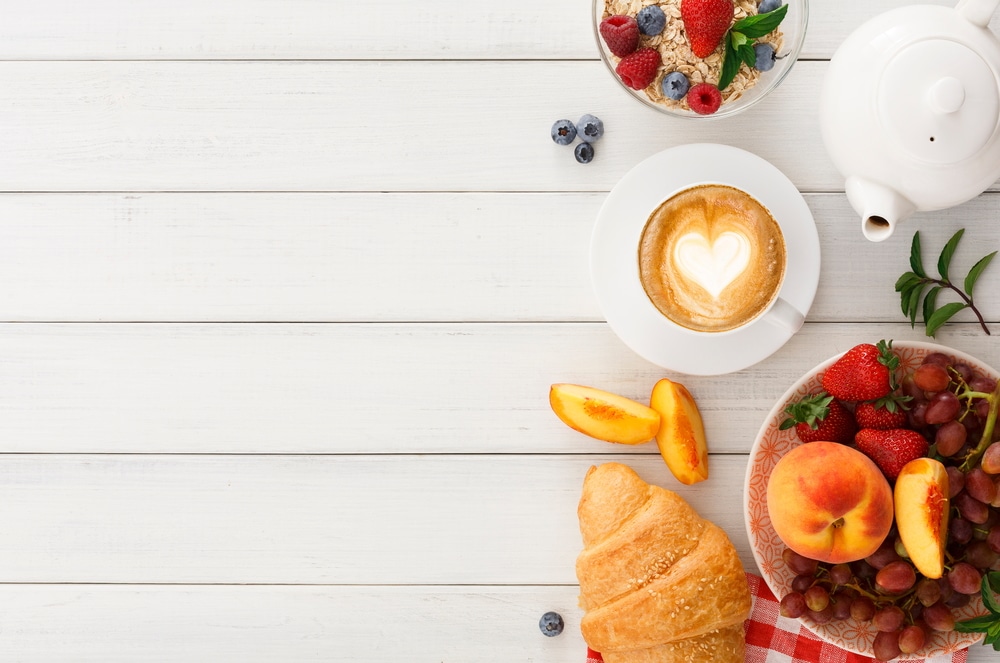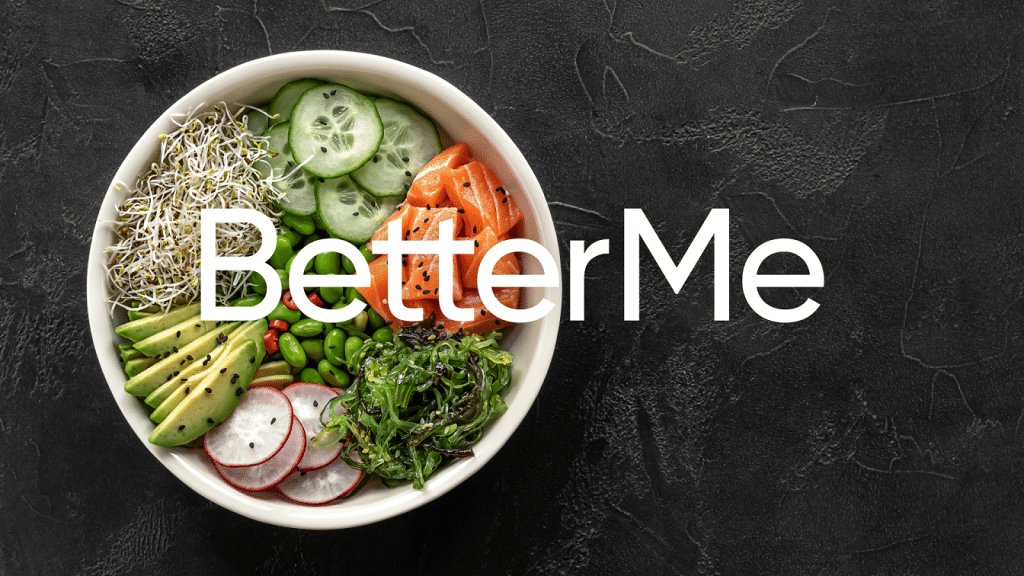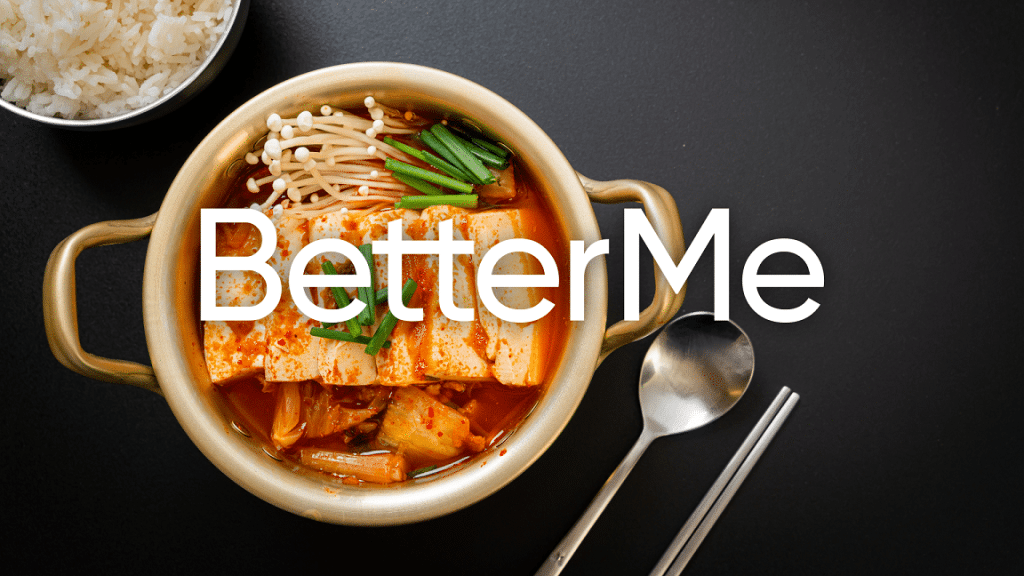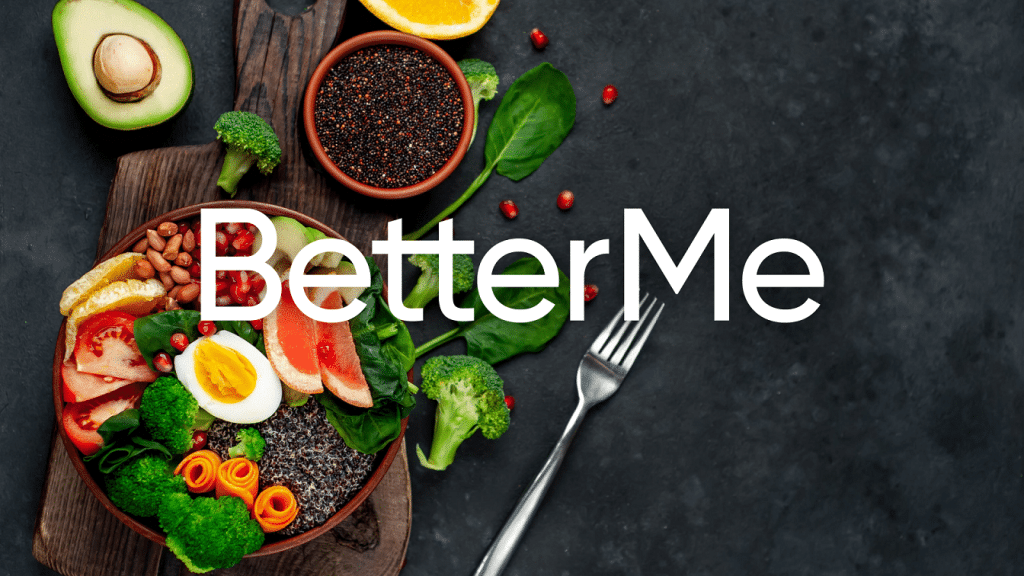Did you know that of the women who skip breakfast, 25% do so because they are too busy? You might be in the habit of skipping breakfast because you are late for work or school. So you just dive right into your day without sparing a few minutes to get that first meal of the day. Eating breakfast can make quite the difference in your day. Breakfast is often quoted as the most important meal of the day. But why is breakfast so important? Here are reasons why the first meal is essential and how to easily fit it into your day.
Get your personalized
meal plan!
Why Is Breakfast So Important?
Breakfast means breaking the fast, just as the name suggests. You need breakfast to fuel your energy levels so that you can get the most out of your day. Several studies show that eating breakfast helps you concentrate and lowers the risk of cardiovascular disease and type 2 diabetes.
About 18% to 25% of adults are in the habit of skipping breakfast. It is suggested that about 15 to 30 % of your daily energy intake should be taken during the morning meal (9).
You probably skip the morning meal because you do not have time to prepare it. But it does not always have to be that complicated. There are many creative ways to have your breakfast, even with that extra busy schedule. And given the great benefits of breakfast to your health, those additional minutes you spare for breakfast are worth it.
Read More: Breakfast Is The Most Important Meal Of The Day Myth Debunked
Still wondering ‘why is a healthy breakfast so important?’ Here’s why eating the right breakfast is so important:
Boosts Your Energy Levels
The body’s fuel source is glucose. Glucose is the simplest form of carbohydrates, and we get it from foods rich in carbs, such as potatoes, bread, or fruit. The body stores the excess glucose that it doesn’t need for energy as glycogen, most of it in the liver, with more modest sums in the muscles. When body cells are saturated with glycogen, the extra glucose is stored as fat (5).
During seasons of fasting, the liver separates glycogen and delivers it into your circulation system as glucose to keep your blood glucose levels stable. This is particularly significant for cells that depend on anaerobic metabolism and your brain that relies on glucose for energy (5).
After you have deserted sustenance for as long as 12 hours, your glycogen stores are low at the start of the day. At the point when all the energy from your glycogen saves is spent, the body moves to lipid digestion to create energy. Nonetheless, without sugar, unsaturated fats are not fully oxidized, which can diminish your energy levels.
Having the morning meal supports your energy levels and reestablishes your glycogen levels. Skipping breakfast may appear to be a decent method to lessen energy consumption. However, research shows that even with higher energy intake, breakfast eaters will generally be more active towards the beginning of the day than the individuals who don’t eat until some other time in the day.
Stimulates The Brain
If you skip breakfast, you may find that you drag yourself through the morning and can hardly get anything done. Eating breakfast is linked to improved cognitive function, including concentration (10). And with increased attention, you increase your productivity and get the most out of your day.
It is crucial for kids to eat breakfast much as many may not be fans of this meal. Kids are still growing, and their bodies need the nutrients. Children who do not eat in the morning have difficulty focusing and become more tired in school.
Why is breakfast so important for students? Students need breakfast to help them stay alert and focused (7). If a child skips breakfast, they become cranky, and their mood suffers. Additionally, their schoolwork may also be affected.
Encourages Healthier Eating
Individuals who eat breakfast tend to have healthier eating habits and diets than those who do not. They are also less likely to have cravings for salty and sugary snacks. Also, children who skip the morning meal are more inclined to eat junk during the day and be overweight.
If you skip this meal, then you are more likely to reach for a snack. It is even worse if the snacks you opt for are ultra-processed, meaning they are high in sugar and fat and low in fiber and nutrients. You might also reach for a soda or energy drink.
In doing this, you fill your body with a lot of extra calories that have no nutritional value whatsoever. Research shows that high consumption of ultra-processed foods is linked to the increased risk of cerebrovascular, cardiovascular, and coronary heart diseases (12).
So it is best to plan your morning meals. A high protein meal is encouraged for breakfast as it leaves you fuller for longer (3). You can opt for healthier snacks like Greek yogurt, fresh fruit, nuts, or vegetable sticks.
If you wish to free yourself from all the extra pounds that have been weighting you down for way too long, start using the BetterMe app and overhaul your entire life!
Provides The Body With Essential Vitamins And Minerals
Breakfast food varieties are rich in essential supplements like folate, calcium, iron, B vitamins, and fiber. A balanced breakfast gives a great deal of your day’s unlimited supplement admission. Individuals who have the morning meal are bound to meet their suggested day-by-day admissions of nutrients and minerals more easily than individuals who don’t.
Individuals must acquire fundamental vitamins, minerals, and different nutrients from food. Even though your body can, for the most part, muster sufficient nerve to make it to the following dinner, you need to top up your nutrient and mineral levels to keep up wellbeing and essentialness.
May Lower The Risk Of Illness
Studies show an increased prevalence of cardiometabolic risk factors such as high blood pressure, obesity, unfavorable lipid profiles, and diabetes in individuals who do not have breakfast. This consequently results in a higher risk of cardiovascular disease (9). Cardiovascular diseases remain the leading contributor to mortality worldwide.
Eating healthy meals and being physically active is the only way to prevent cardiovascular diseases. And breakfast counts as the most important meal, meaning skipping it is counterproductive.
Helps Keep Your Weight In Check
Why is breakfast so important for losing weight? Individuals who consistently have breakfast are less inclined to be overweight or obese. A small study done on a group of school students showed that irregular breakfast eating is linked to being overweight and a low frequency of healthy behavior such as physical exercise (8).
It is believed that having breakfast may help you control your weight because:
- It prevents enormous variances in your blood glucose levels, assisting you with controlling your hunger.
- Breakfast tops you off before you become genuinely ravenous, so you’re more averse to simply get whatever food sources are close by when hunger indeed strikes (for instance, high energy, high-fat snacks with added sugars or salt).
Is Skipping Breakfast Harmful?
Although skipping the morning meal may seem like the best way to reduce calorie intake, it does have some negative implications. So what happens when you miss the first meal of the day?
May Be Bad For Your Heart
Studies show that skipping breakfast regularly is bad for your heart. This is because it is associated with cardiovascular disease risk factors such as obesity, diabetes, and hypertension. It is also associated with an increased risk of death as a result of heart disease (9).
Unhealthy behaviors that may lead to heart diseases such as eating too many calories, too much sugar, smoking, and physical inactivity also seem to be prevalent among breakfast skippers. Also, compared to individuals who take breakfast daily, those who eat breakfast zero to two times weekly are more likely to die from stroke (9).
You Deprive Yourself Of Important Nutrients
Starting your day without a meal means you are denying your body the essential nutrients it needs to function, such as protein, carbs, and vitamins. So much as you may try to compensate during your other meals, you may end up not getting the right amount of nutrients and minerals.
Read More: 4 Macronutrients: A Simple Guide to Macros
You May Get Unhealthy Cravings
No morning meal means no energy or nutrients for your body since your last meal the previous night. This could be within a time frame of 12 to 14 hours. So in between the morning, you might easily reach for a candy bar or sugary drink to replenish your energy levels. Often your snack choices at this time are not healthy.
You may end up eating foods with high amounts of added sugars and fats. The result is you consume a lot of extra calories that may result in weight gain. Even though you are not a breakfast fan, your body needs to be fed to function properly.
Your Productivity May Be Affected
Skipping breakfast may mean that your morning is off to a plodding start. You may drag through your morning activities as your concentration levels are low because of the low blood sugar levels. You will be less focused and less alert, lowering your overall productivity. On skipping breakfast, you also may be cranky and restless.
But sometimes people have valid reasons for skipping breakfast, such as:
- Trying to lose weight.
- Not being able to tolerate food in the morning.
- Feeling lazy or too tired to whip up a meal.
- Running late for work or school.
- Wanting a few extra minutes of sleep.
- Being bored of monotonous breakfast meals.
- Not feeling hungry in the morning.
While skipping breakfast may not be advisable, good nutrition is more than just meal timing. It is crucial to remember that your overall nutritional intake is what matters most. It may also be best to listen to your body and eat when you are hungry and not just because it’s breakfast time. So if you miss breakfast, try to make up for the nutritional content you skipped out on during your snack times, lunch and dinner.
What Is The Right Breakfast?
Taking a chocolate donut in the morning will not do the trick. A healthy breakfast needs to be well balanced and contain the three macronutrients – protein, carbs, and vitamins. It also needs to include healthy fats and fiber. So if you are in the habit of eating just toast and coffee every morning, you need to make a few adjustments.
Research indicates that a large breakfast (and smaller dinner) may be ideal for weight loss and reducing the risk of diabetes and heart diseases (6). Also, it has been shown that people who eat a higher calorie breakfast burn more calories after eating in the morning than individuals who consume large dinners (11). It is crucial that you take the right amount of calories during breakfast and not too little or too much.
Every person has different calorie needs. Your daily calorie intake is dependent on your metabolism, age, and level of physical activity. On average, an adult woman requires about 2200 calories and a man about 2700 calories daily (2). Much as a person’s caloric needs may vary from another, the right amount of calories to eat during breakfast is between 350 to 500 calories for women and about 375 to 625 calories for men (1).
The healthiest breakfast is considered to be a high-protein breakfast. Protein helps you build muscle. Additionally, protein regulates the hunger hormones, so you stay full longer, removing the need for unnecessary snacking altogether.
A protein-rich breakfast is also the best breakfast for weight loss. This is because protein temporarily speeds up your metabolism as it has a higher thermic effect than carbs and fats. Thus, the body burns more calories as the body uses up more energy to metabolize protein (4). If you do not have time to take your breakfast at home, you can pack it and have it on the bus or once you get to work or school.
Below are a few breakfast ideas you can try:
- Whole-grain cereal – cereal is an excellent source of carbs. You can opt for cereals like whole-grain biscuits or muffins, bran cereals or muesli, and accompany them with milk, yogurt, or fresh fruits. Adding nuts, seeds, or nut butters can help boost the protein as well.
- Greek yogurt. This is a good protein source. You can make yogurt parfaits with mixed berries, strawberries, and homemade granola.
- Peanut butter and whole-grain bread. Spreading peanut butter on toast is one of the easiest morning meals to prepare. You can accompany it with milk or coffee. If you have a nut allergy, you can use avocado as an alternative spread.
- Omelet with vegetables. Eggs are a rich source of protein. You can prepare an omelet and add vegetables like tomatoes and onions or even leftover vegetables. Make muffin-pan mini-frittatas ahead of time and freeze them for a grab-and-go breakfast. Other egg recipes like deviled or hard-boiled eggs also make fine morning meals.
- Oatmeal. This is a porridge made from rolled oats. Oats are high in fiber compared to other grains. You can pair it with nuts, fruits, milk, or yogurt to make it even tastier.
- Breakfast shakes. You can make smoothies from various fresh fruits, vegetables with whole milk or yogurt.
- Sandwiches. There are plenty of sandwich ideas you can try. You can even come up with your own. Tuna, potato, egg and cucumber, grilled cheese, cheese vegetable, and egg mayo sandwiches all make for a great breakfast meal. You can have a side plate of vegetables and drink some green tea.
Yanking yourself back in shape has never been so easy with our game-changing fitness app! Start transforming your life with BetterMe!
What If You Can’t Tolerate Food In The Morning?
For some, the morning meal doesn’t cross their minds because they cannot tolerate food in the morning. This makes it almost entirely impossible to sit down at the table in the morning for breakfast. If this is the case for you, what should you do?
If it is hard for you to eat any food in the morning, here’s what you do:
Eat Light Food In The Evening
Eating light food for your dinner might be best if you cannot eat and feel nauseous in the morning. Reduce the amount of food you eat in the evening and eat earlier so that you are hungry when you wake up.
Having your evening meal late may result in indigestion and heartburn. Eating late means that the body does not get enough time to digest the food properly. Thus, there may be some leftover acid in your stomach which makes you nauseous in the morning.
Go For A Morning Walk
A quick morning walk may also help as it boosts metabolic activity. So take a short walk around the block before you prepare and sit down for your breakfast. Walking for 15 to 20 minutes should be enough.
Take A Snack First
You can fix a lack of appetite in the morning by taking a snack. Skipping breakfast every day is not good for you as you don’t take essential nutrients. Start your day by taking a nutritious snack like nut butter, a protein bar, or fruits like apples or bananas. After that, you can wait 30 minutes, then go ahead and sit down for your morning meal.
Give Your Body Some Time
If you have a hard time eating in the morning, it might be best not to eat soon after waking up. You can hold off breakfast until later in the morning, about 2 hours after you have woken up.
Break Your Breakfast Down
Just like you spread out meals throughout the day, you can do the same thing for breakfast. Now that you cannot stomach a full meal, divide it into small portions and distribute them throughout your morning. The goal here is to get the right amount of calories from breakfast even though you do not get them all at once.
Conclusion
Understanding why eating breakfast is so important helps you get the right amount of calories and nutrients. You start your day on a good foot feeling re-energized after that morning meal. And preparing breakfast doesn’t always have to be tiring. Try new recipes and make sure you have a well-balanced breakfast, so that you get the most out of it.
Supplement your diet with some exercise to double your results. Check out this 20-min Full Body Workout at Home.
DISCLAIMER:
This article is intended for general informational purposes only and does not address individual circumstances. It is not a substitute for professional advice or help and should not be relied on to make decisions of any kind. Any action you take upon the information presented in this article is strictly at your own risk and responsibility!
SOURCES:
- Breakfast: The most important meal of the day? (2017, sciencedirect.com)
- Calories: Requirements, health needs, and function (2017, medicalnewstoday.com)
- Consuming pork proteins at breakfast reduces the feeling of hunger before lunch (2012, pubmed.ncbi.nlm.nih.gov)
- Diet induced thermogenesis (DIT) (2004, ncbi.nlm.nih.gov)
- Glucose – an overview (n.d, sciencedirect.com)
- High caloric intake at breakfast vs. dinner differentially influences weight loss of overweight and obese women (2013, pubmed.ncbi.nlm.nih.gov)
- Influence of having breakfast on cognitive performance and mood in 13- to 20-year-old high school students: results of a crossover trial (2008, pubmed.ncbi.nlm.nih.gov)
- Irregular breakfast eating and health status among adolescents in Taiwan (2006, pubmed.ncbi.nlm.nih.gov)
- Skipping Breakfast and the Risk of Cardiovascular Disease and Death: A Systematic Review of Prospective Cohort Studies in Primary Prevention Settings (2019, ncbi.nlm.nih.gov)
- The Effects of Breakfast and Breakfast Composition on Cognition in Adults (2016, ncbi.nlm.nih.gov)
- Twice as High Diet-Induced Thermogenesis After Breakfast vs Dinner On High-Calorie as Well as Low-Calorie Meals (2020, academic.oup.com)
- Ultra-Processed Foods Are Not “Real Food” but Really Affect Your Health (2019, ncbi.nlm.nih.gov)















